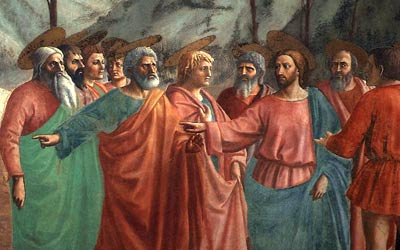DAILY MEDITATION: "If you want to follow me (…) take up your cross and follow me"
Liturgical day: Twenty-fourth Sunday in Ordinary Time (B)
 Gospel text (Mk 8,27-35): Jesus set out with his disciples for the villages around Caesarea Philippi; and on the way He asked them, "Who do people say I am?". And they told him, "Some say you are John the Baptist; others say you are Elijah or one of the prophets". Then Jesus asked them, "But you, who do you say I am?". Peter answered, "You are the Messiah". And He ordered them not to tell anyone about him.
Gospel text (Mk 8,27-35): Jesus set out with his disciples for the villages around Caesarea Philippi; and on the way He asked them, "Who do people say I am?". And they told him, "Some say you are John the Baptist; others say you are Elijah or one of the prophets". Then Jesus asked them, "But you, who do you say I am?". Peter answered, "You are the Messiah". And He ordered them not to tell anyone about him.
Jesus then began to teach them that the Son of Man had to suffer many things and be rejected by the elders, the chief priests and the teachers of the Law. He would be killed and after three days rise again. Jesus said all this quite openly, so that Peter took him aside and began to protest strongly. But Jesus turning around, and looking at his disciples, rebuked Peter saying, "Get behind me Satan! You are thinking not as God does, but as people do".
Then Jesus called the people and his disciples and said, "If you want to follow me, deny yourself, take up your cross and follow me. For if you choose to save your life, you will lose it; and if you lose your life for my sake and for the sake of the Gospel, you will save it".
"If you want to follow me (…) take up your cross and follow me"
Fr. Antoni CAROL i Hostench
(Sant Cugat del Vallès, Barcelona, Spain)
Today we find ourselves confronted with situations similar to those described in this evangelical passage. If, right now, God would ask us "But you, who do you say I am?" (Mk 8, 27), we should have to warn him He could receive all kind of replies, some even rather quaint. It would suffice to have a look at what is going on in today's communication revolution. Except that… more than twenty centuries of the “time of the Church” have already gone by. After so many years, we complain and —along with St. Faustine— we grumble before Jesus: "Why is the number of those who know you so small?".
On occasion of that confession of faith made by Simon Peter, Jesus, "ordered them not to tell anyone about Him" (Mk 8, 30). His messianic claims to be the Son of God were to be transmitted to the Jewish people with a progressive pedagogy. Later on, there would come the culminating moment when Jesus Christ would declare —once and for all— that He was the Messiah: "You say that I am" (Lk 22, 70). Ever since, we have no more excuses not to declare him or recognize him as the Son of God who came to this world to save us. Even more so: all of us who have been baptized into Christ have this “priestly” joyous duty "to go into the whole world and proclaim the gospel to every creature" (Mk 16, 15). This call to preach the Good News is therefore more urgent if we bear in mind that we keep on hearing all kind of wrong, and even blasphemous, opinions about him.
But the announcement of his Messianism and the advent of his Kingdom occurs through the Cross. Effectively, Jesus Christ "began to teach them that the Son of Man must suffer greatly" (Mk 8, 31), and the Catechism reminds us that "the Church progresses on her pilgrimage amidst this world's persecutions and God's consolations" (n. 769). Therefore, this is the path to follow Christ and to make him known to all peoples: "If you want to follow me (…) take up your cross and follow me" (Mk 8, 34).
Source: evangeli.net

